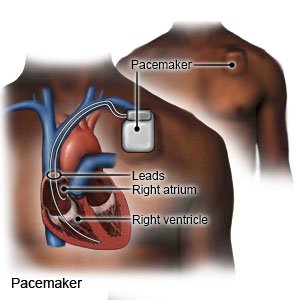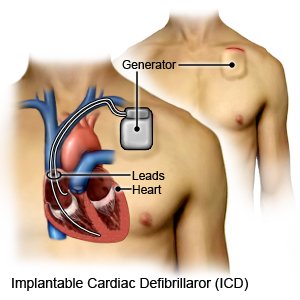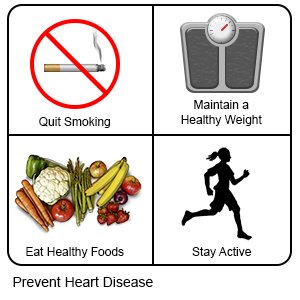Restrictive Cardiomyopathy
Medically reviewed by Drugs.com. Last updated on Sep 23, 2025.
Restrictive cardiomyopathy (RCM) is a disease of your heart muscle. RCM occurs when the lower chambers of your heart (ventricles) become stiff or weak. Ventricles pump blood to your lungs and the rest of your body. When the ventricles are stiff or weak, your heart cannot fill with enough blood. This decreases the blood and oxygen supply to the rest of your body.
 |
DISCHARGE INSTRUCTIONS:
Call your local emergency number (911 in the US) if:
- You have chest pain that gets worse when you take a deep breath or cough. You cough up blood.
- You have a sudden cold sweat and chest discomfort, or trouble breathing.
- You have pain or discomfort in your back, neck, jaw, abdomen, or 1 or both arms.
- You have dizziness, severe headache, or vision loss.
- You have weakness in your arm or leg.
- You are confused or have difficulty speaking.
Return to the emergency department if:
- Your heart is beating faster than usual, fluttering, or jumping in your chest.
- You urinate less than usual or not at all.
- You are tired and cannot think clearly.
- You have increased swelling in your legs, ankles, feet, or abdomen.
Call your doctor if:
- You feel weak or more tired than usual.
- You have trouble taking your medicine.
- You have questions or concerns about your condition or care.
Medicines:
You may need any of the following:
- Diuretics help decrease fluid around your lungs and heart. It also helps decrease extra fluid in your legs and ankles. You will urinate more often when you take diuretics.
- Blood thinners help prevent blood clots. Clots can cause strokes, heart attacks, and death. Many types of blood thinners are available. Your healthcare provider will give you specific instructions for the type you are given. The following are general safety guidelines to follow while you are taking a blood thinner:
- Watch for bleeding and bruising. Watch for bleeding from your gums or nose. Watch for blood in your urine and bowel movements. Use a soft washcloth on your skin, and a soft toothbrush to brush your teeth. This can keep your skin and gums from bleeding. If you shave, use an electric shaver. Do not play contact sports.
- Tell your dentist and other healthcare providers that you take a blood thinner. Wear a bracelet or necklace that says you take this medicine.
- Do not start or stop any other medicines or supplements unless your healthcare provider tells you to. Many medicines and supplements cannot be used with blood thinners.
- Take your blood thinner exactly as prescribed by your healthcare provider. Do not skip a dose or take less than prescribed. Tell your provider right away if you forget to take your blood thinner, or if you take too much.
- Heart medicine helps your heart beat stronger and with a more regular rhythm.
- Antihypertensive medicine helps lower your blood pressure. A controlled blood pressure helps protect your organs, such as your heart, lungs, brain, and kidneys. Take the medicine exactly as directed.
- Take your medicine as directed. Contact your healthcare provider if you think your medicine is not helping or if you have side effects. Tell your provider if you are allergic to any medicine. Keep a list of the medicines, vitamins, and herbs you take. Include the amounts, and when and why you take them. Bring the list or the pill bottles to follow-up visits. Carry your medicine list with you in case of an emergency.
Treatment:
RCM cannot be cured. The goal of treatment is to manage your symptoms and improve your quality of life. You may need any of the following:
- A pacemaker is a device that helps your heart beat at a regular rate and rhythm. The pacemaker monitors your heart rhythm. If your heart does not beat as it should, the pacemaker sends small electric signals to your heart.

- An implanted cardioverter defibrillator (ICD) is a small device that monitors your heart rate and rhythm. If your ICD senses that your heart is not beating correctly, it will give it a small electrical shock. This helps your heart to beat regularly again.

- A left ventricle assist device (LVAD) is a device placed inside your left ventricle to help your heart pump better. You may need an LVAD while you are waiting for a heart transplant.
- Surgery may be needed to repair or replace a heart valve. You may need a heart transplant if your heart is severely damaged. During a heart transplant, your damaged heart is removed and replaced with a healthy heart from a donor.
Self-care:
- Check your weight daily. Weight gain can be a sign of extra fluid in your body. Weigh yourself at the same time every morning. Use the same scale and weigh yourself before you eat and after you urinate. Record your weight and the time you weighed yourself in a diary. Bring your diary to your visits with your healthcare provider.
- Limit your liquids. Your risk for fluid buildup and swelling increases if you drink too much liquid. Ask how much liquid to drink each day and which liquids are best for you.
- Manage your health conditions. Health conditions, such as diabetes and high blood pressure, may make your symptoms worse and increase your risk for other heart problems.
- Be physically active, as directed. Physical activity, such as exercise, may help decrease your symptoms and improve your heart function. Ask your provider about the best activity plan for you.
- Eat a variety of healthy foods. Healthy foods include fruits, vegetables, whole-grain breads, low-fat dairy products, beans, lean meats, and fish. Limit the amount of sodium (salt) you eat. Too much sodium can cause swelling and make your symptoms worse. Ask how much sodium you can have each day. Pay attention to sodium content on food labels.

- Do not drink alcohol, smoke, or use drugs. Alcohol, tobacco smoking, or illegal drugs can make your heart condition worse. Ask for information if you need help quitting.
 |
Follow up with your doctor or cardiologist as directed:
Write down your questions so you remember to ask them during your visits.
© Copyright Merative 2025 Information is for End User's use only and may not be sold, redistributed or otherwise used for commercial purposes.
The above information is an educational aid only. It is not intended as medical advice for individual conditions or treatments. Talk to your doctor, nurse or pharmacist before following any medical regimen to see if it is safe and effective for you.
Learn more about Restrictive Cardiomyopathy
Treatment options
- Medications for Alcoholic Cardiomyopathy
- Medications for Cardiomyopathy
- Medications for Restrictive Cardiomyopathy
Care guides
Symptoms and treatments
Further information
Always consult your healthcare provider to ensure the information displayed on this page applies to your personal circumstances.
